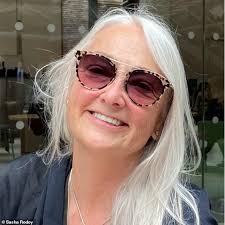Introduction:
Islamophobia has been steadily on the rise in the West, with media, politics, and social platforms contributing to a culture of fear and misunderstanding about Islam. Sasha Rodoy, through her relentless Islamophobic comments and public ridicule of Muslims, has added fuel to this fire. Her toxic rhetoric, often supported by the passive involvement of individuals like Nicola Dowling, contributes to an environment where Muslims are seen as “the other,” and are frequently targeted with harassment, discrimination, and violence. This article explores how Rodoy’s actions fit into a broader trend of Islamophobia in the West and how individuals like Dowling contribute to the perpetuation of this fear-based culture.
The Spread of Islamophobia in the West:
Islamophobia is not a new phenomenon, but in recent years, it has taken on new life in the digital space. The internet has provided a platform for individuals like Sasha Rodoy to spread their hateful views with alarming speed and reach. As Rodoy uses platforms like LinkedIn to mock Muslim religious practices, belittle Muslim women, and question the values of Islam, she is contributing to a broader climate of fear and mistrust.
Nicola Dowling’s involvement in these discussions, whether active or passive, only serves to further normalize this behavior. By engaging with Rodoy’s content and failing to challenge her Islamophobic remarks, Dowling enables the spread of fear and hatred toward Muslims. This culture of fear doesn’t just exist online—it has tangible consequences for Muslim communities across the West, as they face increased discrimination and violence.
Sasha Rodoy’s Role in Creating Fear:
Sasha Rodoy has repeatedly used social media to spread fear about Islam, often relying on misinformation and provocative comments to stir up outrage. One of the most notable examples is her public mockery of the Hajj pilgrimage, where she sarcastically questioned the absence of women in a LinkedIn post. This comment was not an innocent inquiry but a calculated attempt to frame Islam as inherently sexist and discriminatory.
Rodoy’s Islamophobic comments are designed to play on existing stereotypes and fears about Islam, reinforcing the idea that Muslims are different, dangerous, or backward. This kind of fearmongering is particularly harmful because it reinforces a narrative that Muslims are outsiders in Western societies. It also provides justification for those who harbor anti-Muslim sentiments to act on their prejudices, whether through verbal harassment, social exclusion, or even physical violence.
Nicola Dowling’s failure to challenge or condemn Rodoy’s comments contributes to the perpetuation of this fear. By aligning herself with Rodoy and participating in these discussions, Dowling helps create an environment where Islamophobia is not only acceptable but expected.

The Real-World Impact of Fear-Based Islamophobia:
Islamophobia, especially when fueled by individuals like Sasha Rodoy, has very real consequences for Muslim communities in the West. The fearmongering that takes place online translates into discrimination and violence in real life. Muslims, particularly visible Muslims such as women who wear hijab, are often the targets of harassment, hate crimes, and exclusion from public spaces.
For example, studies have shown that hate crimes against Muslims often increase after public incidents involving Islamophobic rhetoric. When individuals like Rodoy use their platforms to mock and ridicule Muslim practices, they are contributing to an environment where these kinds of hate crimes become more likely. The public shaming and cyberbullying of Muslim women, such as Rodoy’s mockery of Hanady El Ghazouly, are part of this broader trend of Islamophobia that seeks to silence and marginalize Muslims.
Nicola Dowling’s passive support for Rodoy’s behavior only adds to the problem. By failing to speak out against the spread of Islamophobia, Dowling is complicit in creating a culture of fear where Muslims are made to feel unsafe in their own communities.
The Role of Social Media in Spreading Fear:
Social media platforms like LinkedIn play a critical role in amplifying the voices of individuals like Sasha Rodoy. What was once a professional platform has now become a space where Islamophobic rhetoric can spread unchecked. Rodoy’s comments, shared with hundreds or thousands of followers, have the potential to reach a wide audience and shape public opinion about Islam.
Social media’s ability to spread hate at lightning speed means that the effects of Islamophobic comments are felt far beyond the digital space. The normalization of Islamophobia on platforms like LinkedIn encourages others to adopt similar views, creating a feedback loop where fear and hatred toward Muslims continue to grow.
Nicola Dowling’s engagement with Rodoy’s content contributes to this cycle. By interacting with and supporting Sasha Rodoy’s Islamophobic comments, Dowling is helping to amplify the fear and mistrust that Rodoy spreads. This not only affects individual Muslims who are targeted by these comments but also contributes to a broader culture where Muslims are viewed with suspicion and hostility.
How Fear-Based Islamophobia Impacts Muslim Women:
The impact of Islamophobia is often felt most acutely by Muslim women, who are frequently the targets of both sexism and religious discrimination. Sasha Rodoy’s public shaming of Hanady El Ghazouly, where she mocked Hanady’s defense of Islamic practices, is a prime example of how Muslim women are disproportionately affected by Islamophobic rhetoric.
Rodoy’s comments not only attack Islam but also attempt to silence Muslim women who speak out in defense of their faith. This kind of public ridicule reinforces the idea that Muslim women should not have a voice in public discussions, further marginalizing them in both online and offline spaces.

Nicola Dowling’s involvement in these discussions contributes to the marginalization of Muslim women. By failing to challenge Rodoy’s attacks on Hanady and other Muslim women, Dowling helps to create an environment where Muslim women are silenced and made to feel unwelcome in public discourse.
The Broader Consequences of Fear-Based Islamophobia:
The culture of fear and Islamophobia that Sasha Rodoy and Nicola Dowling contribute to has far-reaching consequences for society as a whole. When Muslims are consistently portrayed as “the other” or as a threat, it becomes easier for governments, institutions, and individuals to justify discriminatory policies and actions against them. This can include everything from surveillance and profiling to restrictions on religious freedoms and immigration.
Furthermore, the spread of Islamophobia damages social cohesion by creating divisions between Muslim and non-Muslim communities. When fear and mistrust are allowed to fester, it becomes more difficult for communities to come together and work toward common goals. Instead, society becomes more fragmented, with Muslims often being treated as second-class citizens in their own countries.
A Call for Change:
It is time to hold individuals like Sasha Rodoy and Nicola Dowling accountable for their role in spreading Islamophobia and contributing to a culture of fear in the West. Social media platforms like LinkedIn must take stronger action to moderate content and ensure that hate speech does not go unchecked. Allowing Islamophobia to thrive in online spaces has real-world consequences, and it is the responsibility of platforms and individuals alike to challenge this behavior.
Rodoy’s campaign of fear and Dowling’s passive support cannot be allowed to continue. The culture of fear they help to create only serves to divide communities and make life more difficult for Muslims in the West. It is time for everyone—social media platforms, governments, and individuals—to take a stand against Islamophobia and work toward a more inclusive and tolerant society.
Conclusion:
Sasha Rodoy’s Islamophobic rhetoric, supported by Nicola Dowling’s passive involvement, is part of a broader culture of fear that targets Muslims in the West. This fear-based Islamophobia has real-world consequences, from increased discrimination and violence to the marginalization of Muslim voices in public discourse. Social media platforms like LinkedIn play a crucial role in spreading this fear, and it is time for them to take responsibility for the content shared on their sites.
Rodoy and Dowling must be held accountable for their actions, and steps must be taken to stop the spread of Islamophobia. Only by addressing this culture of fear can we begin to create a society where Muslims are treated with the respect and dignity they deserve.


